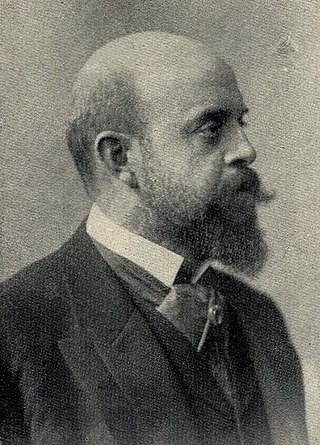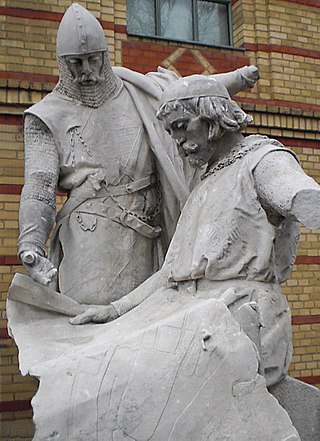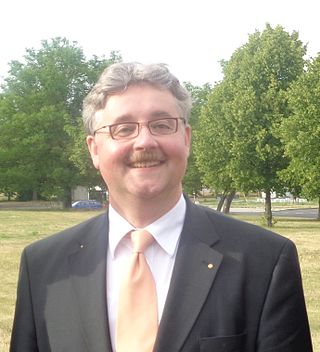Related Research Articles

August Bodo Wilhelm Clemens Paul von Trott zu Solz was a German politician.

Hans von Baysen or Jan Bażyński was a Prussian knight and statesman, leader of the Prussian Confederation and the first Polish governor of Royal Prussia.

Emil Hilb was a German-Jewish mathematician who worked in the fields of special functions, differential equations, and difference equations. He was one of the authors of the Enzyklopädie der mathematischen Wissenschaften, contributing on the topics of trigonometric series and differential equations. He wrote a book on Lamé functions.
Götz Freiherr von Houwald was a German diplomat, historian, and ethnographer. He was born in Posen and died in Bonn. His full name was Maximilian Otto Gustav Albrecht Hubert Wilhelm Götz-Dieter Freiherr von Houwald. Götz-Dieter von Houwald's parents were Albrecht Freiherr von Houwald and Helene Gräfin von Carmer.

The Teutonic Order Research Centre, is a research institution at the Julius-Maximilian University of Würzburg. It is dedicated to the history of the Teutonic Order, with a particular focus on the regional history of Franconia.
Winfried Baumgart is a German historian. His work has a particular focus on German history during the nineteenth century and the opening decades of the twentieth century. His bibliographical directory of Germany history, which first appeared in 1971, proved sufficiently popular to reach 16 editions by 2006.

The Teltow and Magdeburg Wars were fought between 1239 and 1245 over possession of Barnim and Teltow in the present-day federal German state of Brandenburg. They took place in the 13th century during the course of the Eastern German Expansion. The opposing sides during the armed conflict, which took place on two fronts simultaneously, were:
Ewald Frie is a German historian.
Heide Wunder is a German historian.
Michael Buddrus is a German historian.
Dirk Alvermann is a German historian and archivist.
Anton Schindling was a German historian. He held chairs at the Catholic University of Eichstätt-Ingolstadt (1985–1987), the University of Osnabrück (1987–1995) and the University of Tübingen (1995–2015). Thematically he worked on the history of education, the age of Confessionalization and the Holy Roman Empire. He was one of the leading early modern researchers in Germany.
Johannes Kunisch was a German historian. He held chairs of early modern history at the Goethe University Frankfurt. (1972-1976) and the University of Cologne (1976–2002). Through his publications Kunisch became one of the leading German early modern historians. His biography Frederick the Great, published in 2004 and widely acclaimed, gave lasting impulses to Prussian research.
Andreas Pečar is a German historian of the Early modern period and a lecturer at the Martin-Luther-University Halle-Wittenberg.
Hans-Christof Kraus is a German historian.
Helmut Neuhaus is a German historian who specialises on the Early modern period. From 1989 to 2009 he held the Chair of Modern History I at the University of Erlangen–Nuremberg.
Peter Herde is a German historian. His research activities range from fundamental work on papal diplomacy of the Middle Ages to the history of the country up to the Second World War.

Matthias Stickler is a German historian.

Ewald Grothe is a German historian. Since 2009 he has been an extraordinary professor at the Bergische Universität Wuppertal and since 2011 he has been head of the Archive of Liberalism of the Friedrich Naumann Foundation for Freedom in Gummersbach.
Georg Ulrich Großmann is a German art historian. He was general director of the Germanisches Nationalmuseum in Nuremberg.
References
- ↑ Peter Baumgart: Friedrich Wilhelm I. (1713-1740). In Frank-Lothar Kroll Prussian sovereign. From the first Hohenzollern to Wilhelm II. Munich 2000, pp. 134–159.
- ↑ Ordentliche Mitglieder der Historischen Kommission für Schlesien
- ↑ Zinzendorf als Wegbereiter historischen Denkens on WorldCat
- ↑ Universitäten im konfessionellen Zeitalter. Gesammelte Beiträge on WorldCat
- ↑ Brandenburg-Preußen unter dem Ancien Régime. Ausgewählte Abhandlungen on WorldCat
- ↑ Bildungspolitik in Preussen zur Zeit des Kaiserreichs on WorldCat
- ↑ Vierhundert Jahre Universität Würzburg. Eine Festschrift on WorldCat
- ↑ Beiträge zur Bildungsgeschichte. Gewidmet Peter Baumgart anläßlich seines 65. Geburtstages on WorldCat